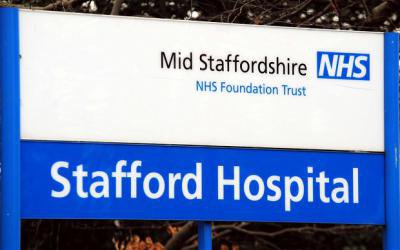
If you were going to release a report arguing that the UK’s health system should become more like that of the United States, you probably shouldn’t do so the day after a huge international study has shown that the UK’s health system is the best in the world - and the US’s the worst.
But right-wing think tank Reform have done just that.
The details of Reform’s latest report needn’t concern us overly. Running the NHS like a supermarket, or a car manufacturer, bringing in more charities and private companies, more internet-based care, fewer properly trained staff... it’s the same old dismally inappropriate, healthcare industry backed stuff, or what Clive Peedell of the National Health Action Party calls the "tired, discredited zombie" policies, that OurNHS has already comprehensively exposed.
More interestingly, to lambast the NHS for its ‘conservatism’ and ‘slowness’ in rushing towards the market, Reform have hired ex-Blair advisor, Paul Corrigan.
On one level it’s not surprising. Reform are fond of Blair-era survivors like Corrigan, who they cite as evidence of their ‘cross-party’ (and charitable) credentials. But they are successfully promoting a commercialised health vision on behalf of their industry backers, and Cameron's key health advisor was recruited directly from Reform.
Corrigan has been a persistent advocate of more NHS competition and privatisation - and is reportedly an 'ally' of fellow ex-Blair advisor, and current NHS boss, Simon Stevens.
What Reform are less keen to remind us - unsurprisingly - is Paul Corrigan’s role in the failings of care at Mid Staffordshire and elsewhere, for which he seems to have got off remarkably lightly so far. In his blog Corrigan has recently coyly acknowledged that he may have had ‘an influence’ in creating the system that led to Mid Staffs - but breezily skates over exactly what that was.
In fact Corrigan was one of the key architects involved, not just in developing and promoting a policy that failed patients badly - but, as a little-noticed section of the Francis report reveals, in personally fostering a culture where warning signs about it were evaded with 'clever tactics', rather than heeded.
Foundation Trust status was a key plank of former health Secretary Alan Milburn’s plans to turn the NHS into a competitive ‘marketplace’, turning NHS hospitals into competing, semi-autonomous bodies.
Corrigan, as special advisor to both Milburn and then his successor John Reid, “lead the creation of NHS Foundation Trusts”, according to his own biography, before moving into Downing Street in 2005 to drive implementation of the policy.
Badged originally as a reward for ‘high performing’ trusts, by 2006, most NHS Trusts were coming under strong political pressure to convert to Foundation Trusts.
As the Francis report into Mid Staffordshire notes -
“Number 10 (was) asking questions about what was going to happen and when the political objective of converting all trusts into Foundation Trusts was going to be fulfilled”.
At this time, the main number 10 health advisor leading the charge towards turning hospitals into Foundation Trusts was none other than Paul Corrigan.
The problem was that to become Foundation Trusts, hospitals had to balance the books. They had to look like semi-autonomous businesses. And they were already struggling under a range of ill-thought through accounting policies and penalties which had caused a severe financial squeeze.
The Mid Staffs director of finance was told to balance the Trust’s books in 2006. To do so, Mid Staffs cut a further 170 staff (on top of 180 staff that had already been cut in 2005).
Campaigner John Lister of London Health Emergency recalls that
“We warned at the time they were taking massive chances with patient care. The consequences were a predictable, tragic reaction to what they’d been press-ganged into”.
As was eventually exhaustively exposed, death rates at mid Staffs were higher than average following these cuts. Julie Bailey, Cure the NHS founder, lost her mother at Mid Staffs hospital in 2007. Bailey is a controversial figure. But she has always been clear that “Our key priority is safe staffing levels” and that Foundation Trusts were the ‘first deception’. Her evidence to the Mid Staffs inquiry highlighted how political imperatives to drive down costs & produce foundation trusts drowned out the dissenting voices. Those driving policy were also pioneers of the idea Trusts could save money quickly by replacing skilled staff with lesser skilled staff.
Buried in the Francis report is a little noted passage that reveals just how far the pressure to rush Trusts to become Foundation Trusts - with little regard for the consequences - was coming from the very top.
In late 2006 the Department of Health’s Foundation Trust team sought permission for a fifth wave of Foundation Trusts - including Mid Staffs.
The civil servant in charge of putting forward the list, Warren Brown, wrote apologetically that:
“The list is shorter than we were previously led to believe and we shall take up with each SHA [Strategic Health Authority] why specific Trusts were thought no longer to be ready. Our intention is to have a much more substantive list for wave 6”.
The Francis report notes:
“This briefing was not met with contentment in Number 10.”
The Francis report goes onto observe that on 13 December 2006 Warren Brown reported:
“[Key number 10 advisor] Paul Corrigan is not happy about the size of wave 5 – i.e. half what we told him SHAs had promised. Have we any sense that we can retrieve ground in wave 6? i.e. that we get the lost 8 or so trusts back without any other losses? Can we think up any clever tactics?”
Challenged on this, “Mr Brown denied that by referring to “clever tactics” he was implying that the criteria to become a Foundation Trust could be watered down, but rather to whether there were any easy explanations for the unfulfilled expectations.”
But in January 2007 Warren Brown suggested that “we might need to be a little softer on those Trusts”.
And in February that year a new guide for becoming a Foundation Trust was published which lowered the quality bar for application from 3 stars to 2, and which, the Francis report notes, “did not even completely rule out applications from trusts whose Healthcare Commission rating was “poor”:”
Of course no one person, including Paul Corrigan, is solely responsible for rushing Trusts that weren’t ready - maybe would never be ready - towards Foundation Trust status for political reasons. The Francis report sets out how the pressure continued after Corrigan’s departure from Number 10. Alongside Lord Warner, Andy Burnham himself was a junior health minister under famously cloth-eared Patricia Hewitt at the point that Mid Staffs was eventually signed off as a Foundation Trust.
But arguably, key number 10 advisors like Corrigan had more influence over the ‘top down, like it or lump it’ approach. And whilst the Tories howl ‘Mid Staffs’ at Andy Burnham at every opportunity (perhaps mindful that his public disavowal of privatisation is popular with voters), they are strangely quiet when unrepentantly pro-market advisors like Corrigan rebrand themselves as eminence grises with something worth saying on the NHS.
Like this piece? Please donate to OurNHS here to help keep us producing the NHS stories that matter. Thank you.
Read more
Get our weekly email


Comments
We encourage anyone to comment, please consult the oD commenting guidelines if you have any questions.